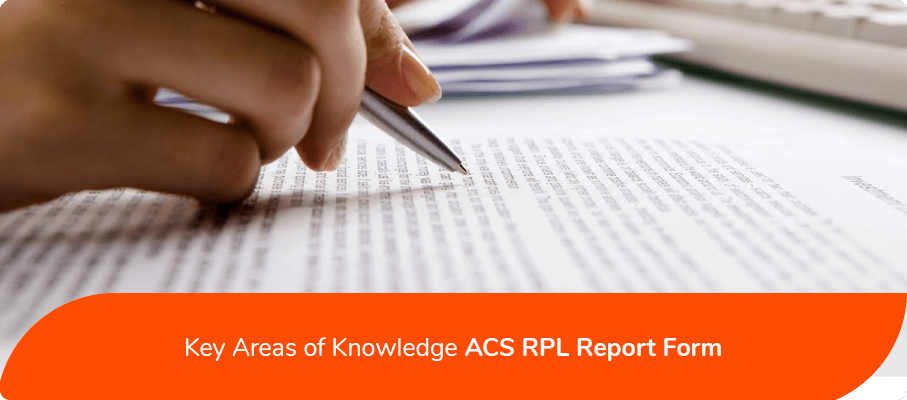
ACS Key Areas of Knowledge in RPL has been generated by the ACS Core Body of Knowledge, i.e., CBOK as a guide for applicants who have not obtained a formal ICT qualification equivalent to an Australian Degree or Diploma but spent abundant time in the ICT field as a professional-level ICT employee and wanted to apply for an ICT Skills Assessment through the RPL assessment process.
The purpose of RPL is to provide applicants with the opportunity to show that they have gained a level of knowledge equivalent to that of a formal tertiary ICT qualification by mentioning as many of the areas related to the Key Areas of Knowledge they have covered by their acquired knowledge.
Applicants are required to provide two project reports as evidence of their level of knowledge. ACS RPL Report Form comprises of two sections:
SECTION 1 – KEY AREAS OF KNOWLEDGE
SECTION 2 – RPL PROJECT REPORT
SECTION 1- Key Areas of Knowledge
The ACS Key Areas of Knowledge is SECTION 1 that you need to fill up in the RPL report form. In this section, you have to clearly mention all your experiences and qualifications that meet the selected topics of Areas of Knowledge.
You need to explain clearly how your experience and qualifications match the chosen fields and explicitly how and where you obtained the information.
Section 1 is based and will be assessed on the following document. Please ensure you read and understand – The ACS Core Body of Knowledge for ICT Professionals (CBOK).
You are required to select one topic from the Essential Core ICT Knowledge (Topic 1 or Topic 2) and one topic from the General ICT Knowledge (Topic 3, Topic 4, or Topic 5). Please make sure that you choose at least two subtopics from each of the main topics chosen.
The ICT Key Areas of Knowledge
| Essential Core ICT Knowledge (Choose one from below two topics) |
General ICT Knowledge (Choose one from below three topics) |
|---|---|
| Topic 1. ICT Professional Knowledge Sub Topics are : |
Topic 3. Technology Resources Sub Topics are : |
| • Ethics | • Hardware and Software Fundamentals |
| • Professional Expectations | • Data and Information Managements |
| • Teamwork Concepts and Issues | • Data Communications and Networking |
| • Communication | |
| • Societal Issues | |
| Topic 2. ICT Problem Solving Sub Topics are : |
Topic 4. Technology Building Sub Topics are : |
| • Modeling Methods | • Human Factors |
| • Processes to understand problems | • Programming |
| • Methods and tools for handling abstraction | • Information Systems Development and Acquisition |
| Topic 5. ICT Management Sub Topics are : |
|
| • IT Governance and Organisational Issues | |
| • IT Project Management | |
| • ICT Service Management | |
| • Security Management |
Format of Section 1 – Key Areas of Knowledge

Steps to know while filling the Key Areas of Knowledge
Identify the Area of Knowledge topic that you have chosen to explain by entering the name of the Area of Knowledge topic in the box.
Explain, in the expandable typing area, how you have acquired the knowledge and illustrate the depth of that knowledge. While writing RPL, choose and explain only 2 subtopics included in the Area of Knowledge, not all subtopics.
Do a clear explanation but no more than one to one and a half pages.
Make sure that you keep all these things in mind while filling RPL Form, ensure all the above steps clearly in detail.
Match your skills and responsibilities with the topics you have chosen, ensure that the topics are related to your working experience that you are going to mention in RPL.
If you are getting problems and confusion to fill up ACS Key Areas of Knowledge, then ACSRPLAustralia is there providing ACS Key Areas of Knowledge Service to you with a 100% guarantee. We have a successful track record of providing ACS Key Areas of Knowledge Service to our clients that leads to a positive assessment.
